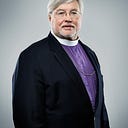There is a body of teachings and practices which is common to Christian churches and that ecumenical dialogues have revealed, which I call “the Narrow Path”. Another way of saying the same thing is the “catholicity” of the Church, its universal character that the boundary conditions of its diversity reveal. The Chicago-Lambeth Quadrilateral was an initial invitation to ecumenical dialogue. It has become a widely-used summary of Anglican ecclesiology. Already in 1888 there was a growing awareness of the diversity of Anglican (Episcopal) churches despite their common origin. The Quadrilateral served not only to outline the terms for fruitful dialogue with other churches, but in a way not intended then for spelling out the boundary conditions of churches in communion with the See of Canterbury.[1] These conditions function in the same way as Article VI of the Thirty-nine Articles of Religion that states that the Scriptures “contain” that which is necessary to salvation.
The 1888 version of the Quadrilateral has four “sides”:
- The Holy Scriptures of the Old and New Testaments, as “containing all things necessary to salvation,” and as being the rule and ultimate standard of faith.
- The Apostles’ Creed, as the Baptismal Symbol; and the Nicene Creed, as the sufficient statement of the Christian faith.
- The two Sacraments ordained by…
